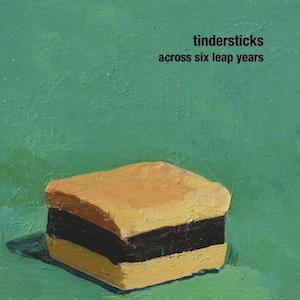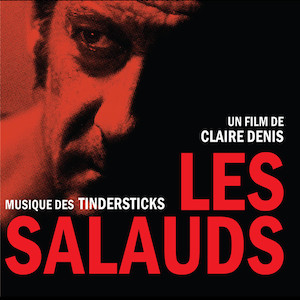Tindersticks, "Across Six Leap Years"/"Les Salauds"
 In their 21st year, Tindersticks have decided to celebrate with two new albums. Across Six Leap Years, a retrospective of sorts, sees them revisiting older material with their current line up and the other is a radical departure as they soundtrack Les Salauds (another Claire Denis film). The soundtrack is the clear winner here but Across Six Leap Years has its moments too.
In their 21st year, Tindersticks have decided to celebrate with two new albums. Across Six Leap Years, a retrospective of sorts, sees them revisiting older material with their current line up and the other is a radical departure as they soundtrack Les Salauds (another Claire Denis film). The soundtrack is the clear winner here but Across Six Leap Years has its moments too.
When the band announced their plans to go into Abbey Road and re-record selected songs from their back catalog, I had the idea that they would take familiar favorites and reinterpret them in surprising or interesting ways. I tried to imagine what songs they would pick: "City Sickness," "Tiny Tears," "CF FG" and "Bathtime" all seemed like sure choices to me or maybe a couple of songs off each of the early albums? What I did not expect was for two songs from Stuart Staples’ solo album Lucky Dog Recordings 03-04 to kick off the album.
This album never grabbed me at the time; it seemed like a sad echo of Tindersticks who I had presumed to be done at that time. Staples has since stated that some of those songs were written for Tindersticks before they split and that they were never given the home they really needed. However, the group’s rendition of "Friday Night" does little to improve the song which still sounds fairly dead in comparison to Tindersticks even on an off day. I have grim feelings where this is going, especially since I do not remember liking the song "Marseilles Sunshine" much. Yet, I am surprised to find that it is given a new lease of life here. Poised and delicate, this is prime Tindersticks that would be comfortable on an album like Curtains or Simple Pleasure.
From here on, the group picks songs from the main Tindersticks songbook but it is an odd selection to say the least. The first album is ignored though they do include three songs from their second album: "A Night In," "Sleepy Song," and "She’s Gone." Unfortunately, none of the versions here top the originals. Only it is possible to hear the changes in Staples’ voice in the intervening 20 years, these could be alternative takes from the original sessions. The exception is "Sleepy Song," which was also recorded in one take in Abbey Road in 1994 with the band arranged around a single microphone and that version which closes their second album has a magic that cannot be replicated, the new take is a bit lacklustre when listened to after the original. The songs are still good but it seems like a waste of studio time now especially considering there are terrific versions of all these songs available as a free download on the official Tindersticks site (from when they performed the second album for ATP’s Don’t Look Back series of concerts).
What strikes me particularly about Across Six Leap Years is how dreary the track selection is. Occasionally the livelier side of the group comes across but I would hesitate to recommend this album to anyone but the most die hard fan as it is a trudge to listen to. Where are the likes of "Her," "For Those," "Black Smoke" or 'Rented Rooms"? Sure there is a good interpretation of "Say Goodbye to the City" but given that they have been storming through the same song on their recent tour, it sounds like they were holding back and playing it safe here.
samples:

Playing it safe is not something that could be said about Les Salauds. For all the toeing the line that Tindersticks do on Across Six Leap Years, the line is well and truly erased for this soundtrack. Brooding and dark, here the band’s usual style and instruments are traded in for electronic gurgles and treated vocals. This shift would be a real shock if Stuart Staples did not name check Cabaret Voltaire’s "Nag Nag Nag" on the band’s website or if the band had not covered Psychic TV as a B-side a couple of years ago, though even with this information in mind Les Salauds seems to come out of nowhere.
The pitch-black mood is unsurprising given the details on the film’s IMDB page (as usual with my reviews of film soundtracks, I have still to get around to watching Les Salauds): suicide, rape, revenge. Yet, there is a tenderness hear despite the weighty themes of the film. Much like their score to Denis’s excellent but extreme sex cannibal drama Trouble Every Day (by far and away my favourite Tindersticks song, it should have been included on Across Six Leap Years), the group do not just regurgitate the clichés and tropes of genre movie scores. Opening the album, "Put Your Love in Me (Fade)" is immediately striking in its form: a pulsing rhythm and electronic drum beat form a muscular centre for Staples’ voice to weave around. Even the familiar sound of his voice is strange, an echoed effect makes him sound like some sort of androgynous ghost. When he sings "I wanna be in heaven!" it sounds like the mournful cry of a soul trapped in limbo.
"Opening" (perhaps unsurprisingly) introduces the melodic themes that run through the soundtracks; an icy synthesiser playing long and sad tones (think the bleakest parts of Joy Division’s Closer) and minimal but powerful electric piano forcing through the darkness. These two elements—the synth and the piano—re-emerge throughout the album like lone shadows stalking the listener. Despite the simplicity of the pieces, they create whole narrative worlds based on the titles alone. The haunted emptiness of "Elevator" and "Low Life" generate enough atmosphere to have the power of a good short story or evocative photograph (those ones that stick with you for years after you have read or seen them). The fact that a film exists to go with these pieces is incidental, Les Salauds works brilliantly on its own terms.
Les Salauds reaches an intense climax with "Night Drive," where all the elements that make the rest of the album so atmospheric are ramped up to a dizzying peak. I cannot actually conceive of whatever scene it is meant to accompany fully matching the frenetic power of "Night Drive" but I am eager to find out. By the time the track finishes and the second (and much longer) version of "Put Your Love in Me" comes on, the tension has come to the point where instead of being a release, it intensifies the paranoia and unease at the centre of the song. This leap into the depths of emotion and experimentation is a far better celebration of the group’s continued existence than the rehash of old songs presented on Across Six Leap Years and with any luck, Les Salauds is a portent of another 21 years of fantastic music.
samples:
 



